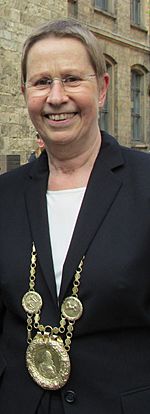Ulrike Beisiegel facts for kids
Quick facts for kids
Ulrike Beisiegel
|
|
|---|---|
 |
|
| Born | 23 December 1952 Mülheim an der Ruhr, North Rhine-Westphalia, West Germany
|
| Nationality | German |
| Known for | first woman president of the University of Göttingen |
| Awards | Heinz Maier-Leibnitz Prize Rudolf Schönheimer Medal |
| Academic background | |
| Alma mater | University of Marburg |
| Influences | Joseph L. Goldstein Michael S. Brown Gunüla O Uvecrona |
| Academic work | |
| Institutions | University of Texas at Dallas Umeå University German Research Foundation University of Göttingen |
Ulrike Beisiegel (born 23 December 1952) is a German biochemist and university professor. In 2011, she became the first woman to lead the University of Göttingen. This university is very old, founded in 1737. Her important research on liver fats and diseases has won her many awards. These include the Heinz Maier-Leibnitz Prize and the Rudolf Schönheimer Medal. She also received an honorary doctorate. Ulrike Beisiegel works hard to keep science honest and excellent. She has served on many important groups. She even received the Ubbo-Emmius Medal for her dedication to good scientific practices.
Contents
About Ulrike Beisiegel
Her Early Life and Studies
Ulrike Beisiegel was born on 23 December 1952. Her hometown is Mülheim an der Ruhr in Germany. She studied biology in Münster and Marburg. In 1979, she earned her PhD from the University of Marburg. Her degree was in Human Biology.
After her studies, she moved to Dallas, Texas, in the United States. There, she did special research with two Nobel Prize winners. Their names were Joseph L. Goldstein and Michael S. Brown. They worked in the Department of Molecular Genetics.
Important Research and Awards
When she returned to the University of Marburg, Ulrike Beisiegel worked as a research assistant. In 1983, she won the Heinz Maier-Leibnitz Prize. This award was for her work on "receptor defects as a cause of disease." This means she studied how problems with cell receptors can lead to illnesses. From 1984, she worked as an academic counselor at the University Medical Center of Hamburg.
In 1989, Ulrike Beisiegel started working with a Swedish scientist. Her name was Gunüla O. Uvecrona from Umeå University. They studied how fats in the blood affect the liver. Their research looked at specific fats and enzymes. They wanted to understand how to prevent heart and blood vessel diseases.
In 1990, she became a professor at the University of Hamburg. She was promoted again in 1996. That same year, Umeå University gave her an honorary doctorate. This was to honor her great work with Gunüla O. Uvecrona. In 2001, she became a higher-level professor. She also became the director of the Institute of Biochemistry and Molecular Biology. This institute is at the University Medical Center Hamburg-Eppendorf.
Leading Science and Universities
Besides teaching, Ulrike Beisiegel has been part of many important science groups. In 2000, she joined a review board for the German Research Foundation. In 2002, she became a member of the Leibniz Association's Senate Evaluation committee. These groups help decide which science projects get support.
In 2006, she joined the German Council of Science and Humanities (GCSH). She was elected as the chair of its research commission in 2008. From 2005, she also helped lead the Ombudsman panel. This group sets rules for good scientific practices. It also checks for scientific misconduct, making sure science is done honestly.
In 2008, Ulrike Beisiegel received the Rudolf Schönheimer Medal. This is a top award for research on atherosclerosis. This disease involves hardening of the arteries. In 2009, she became a Senator of the Leibniz Association. In 2010, she made history. She was confirmed as the first woman president of the University of Göttingen. Her term started on 1 January 2011 and lasted six years.
She continued to take on important roles. In 2011, she became a Senator of the Max Planck Society. In 2012, she became Vice President of the German Rectors' Conference. In 2014, she received the Ubbo-Emmius Medal. This award recognized her research on heart diseases. It also honored her strong commitment to good science. In 2015, the University of Edinburgh gave her an honorary doctorate. This was for her work in university management. It also recognized her efforts to promote teamwork between different fields and countries.
 | Emma Amos |
 | Edward Mitchell Bannister |
 | Larry D. Alexander |
 | Ernie Barnes |

